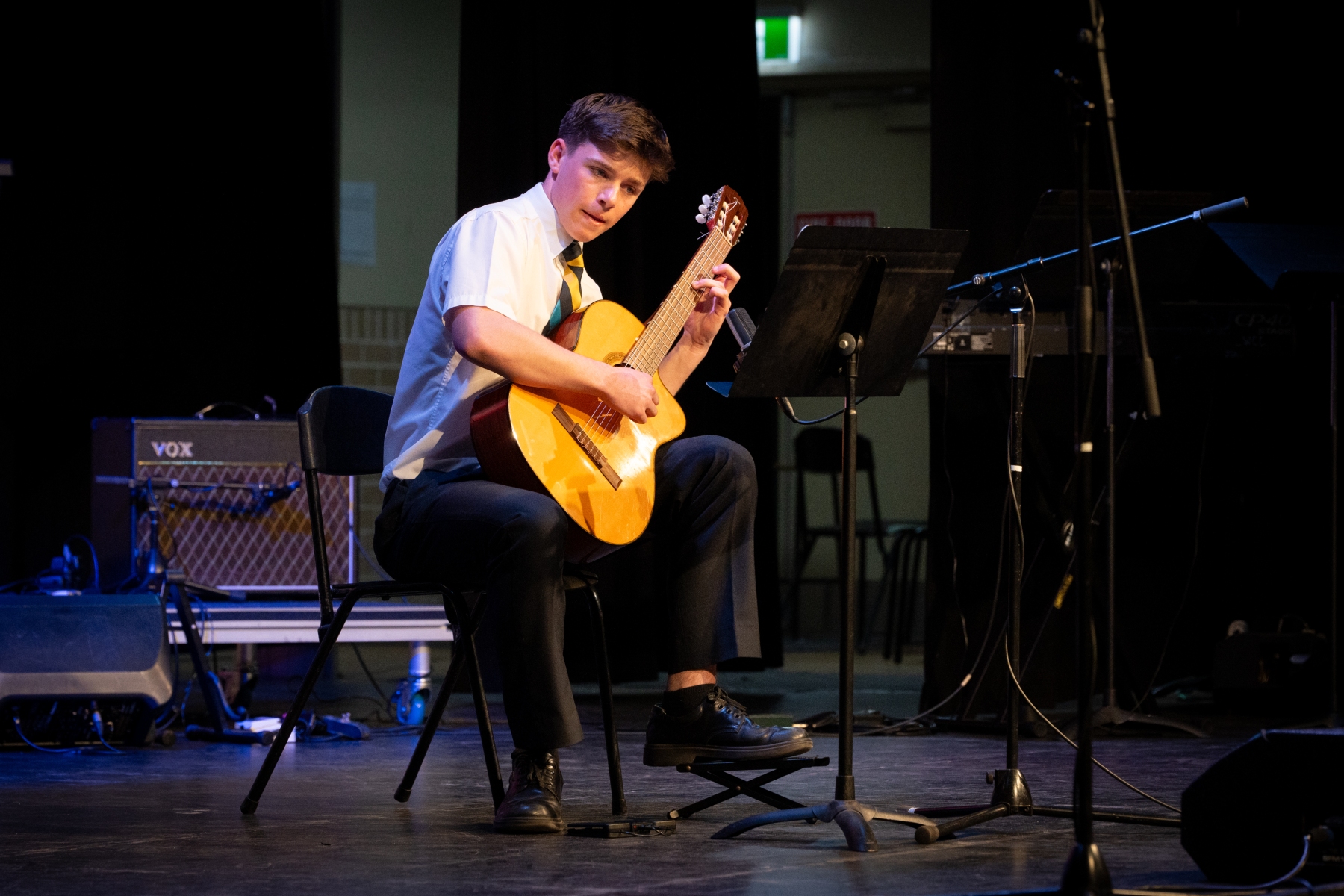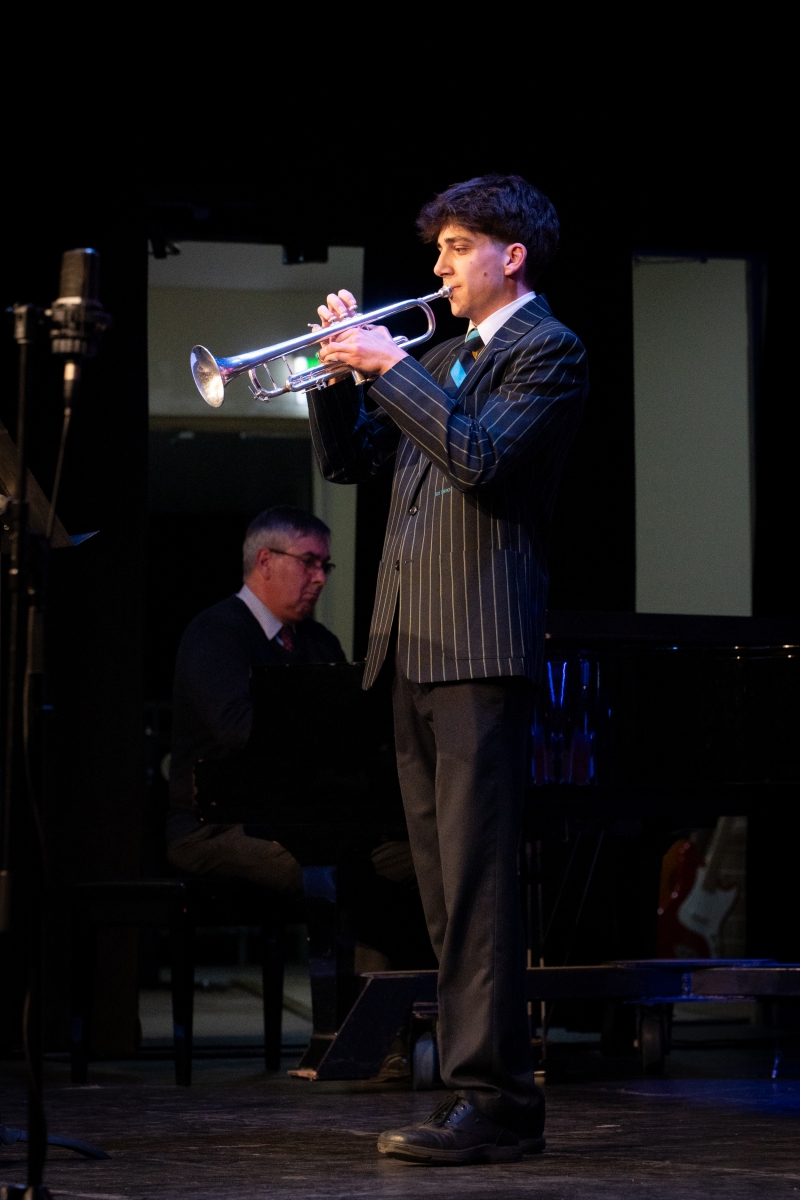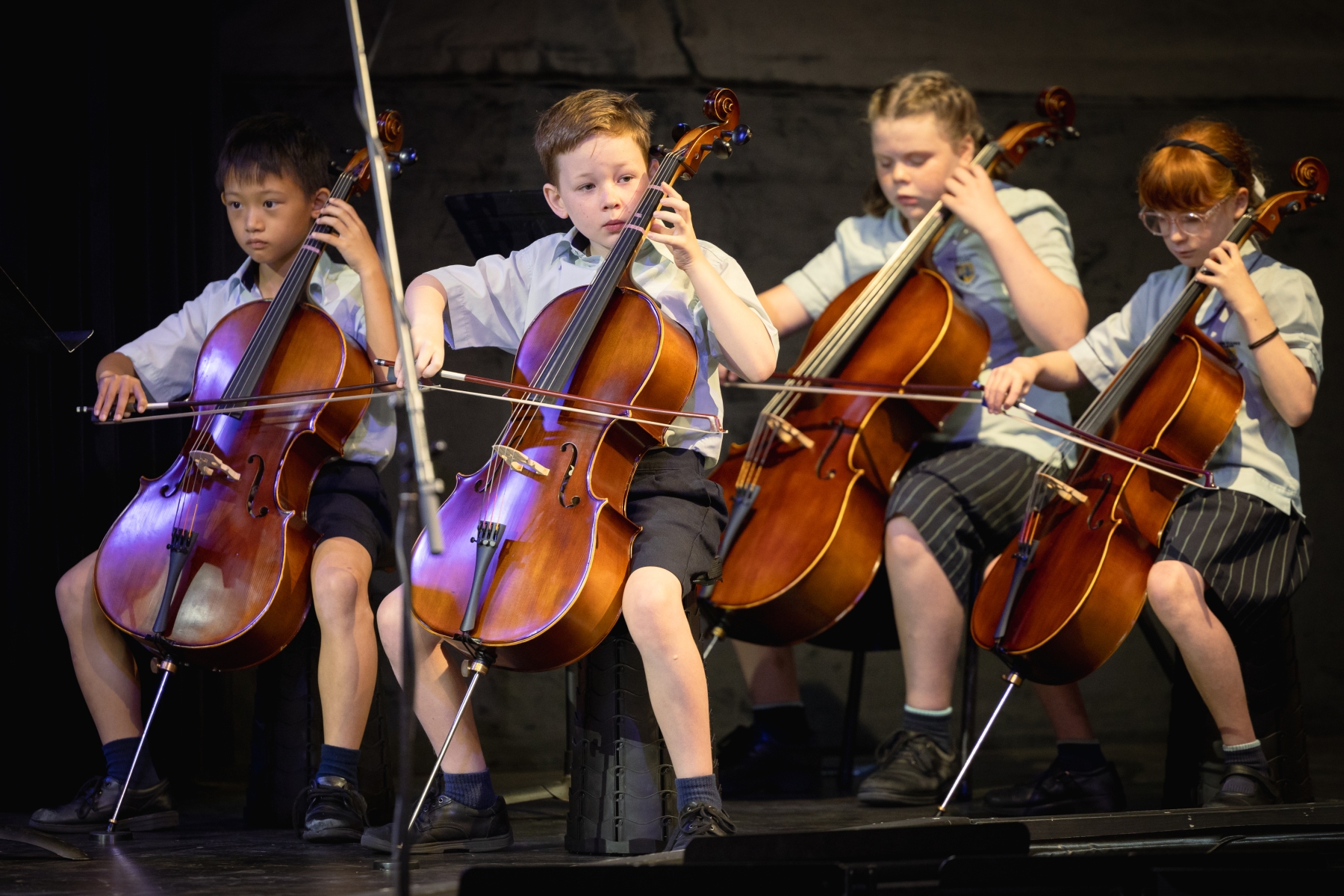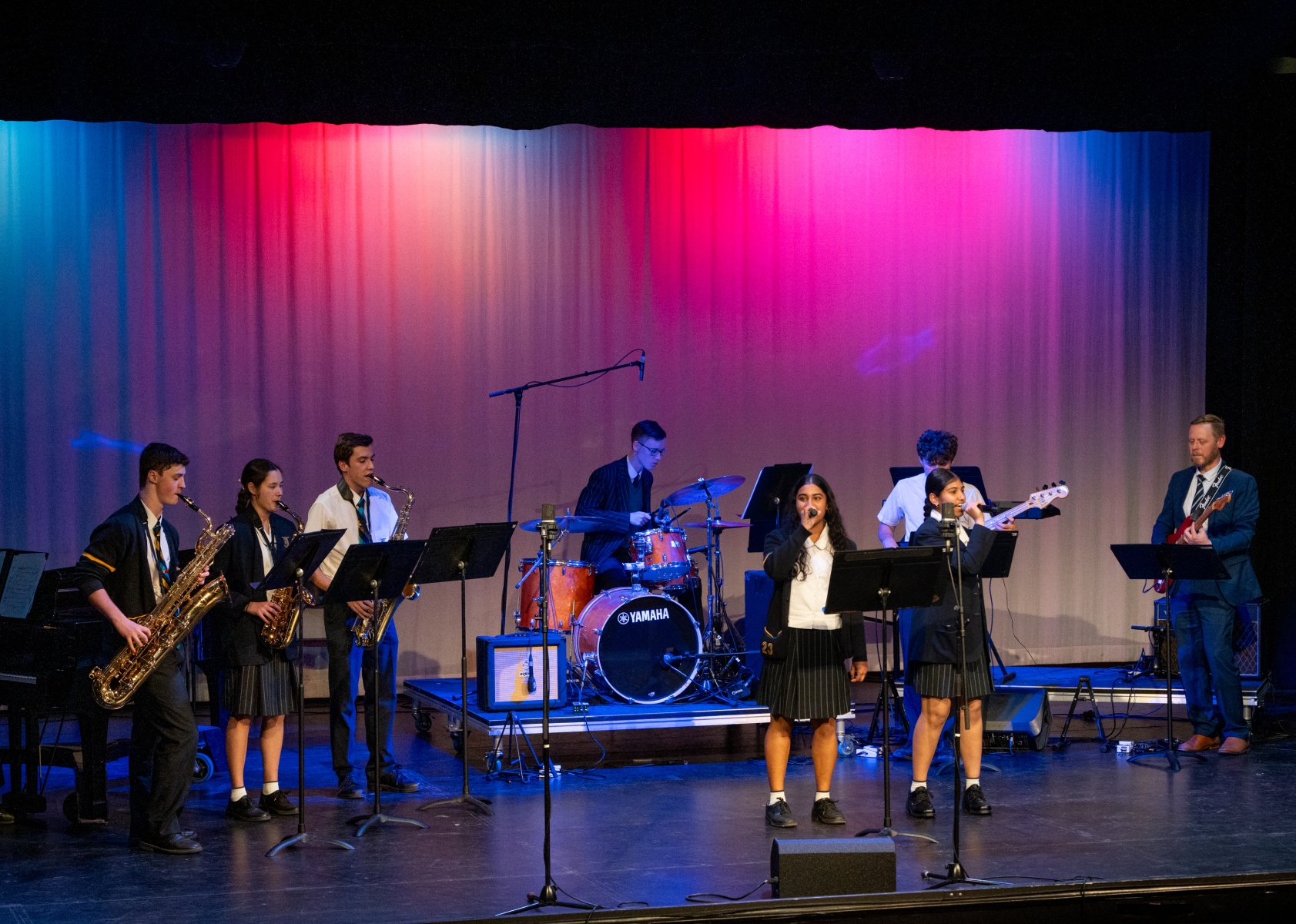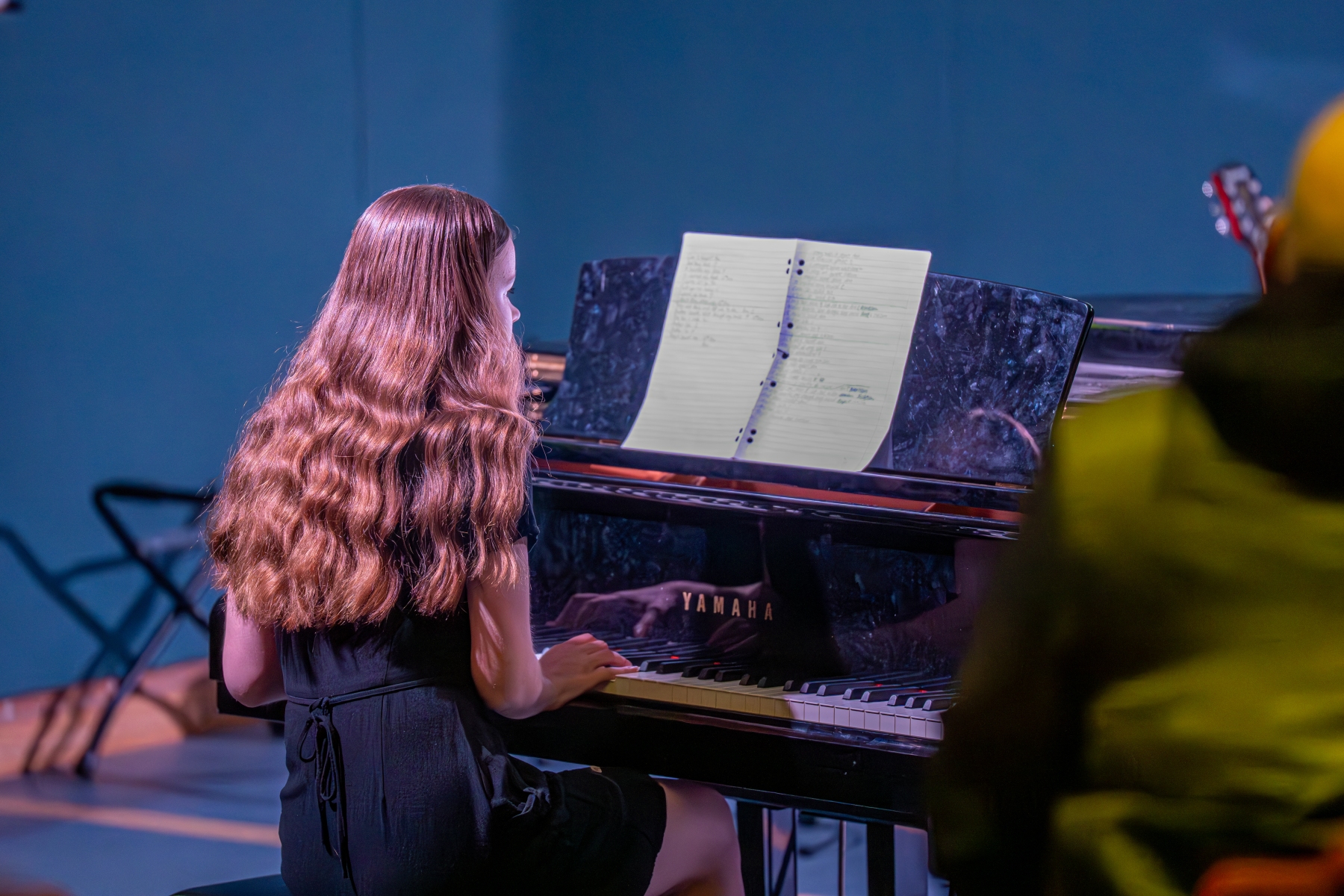Striking the Right Chord
College Life Insight
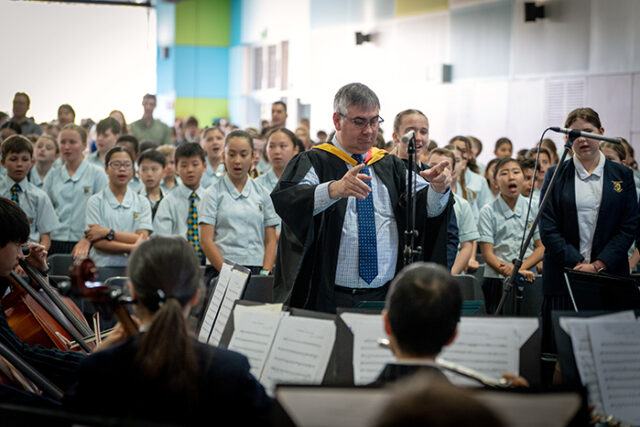
For nearly three decades, Mr Andrew Peachey has masterfully composed the perfect notes, serving as an unwavering beacon of inspiration at William Clarke College. As Director of the Music Faculty, his remarkable dedication and exceptional talent have transformed the College’s Music program into a true celebration of student achievement and musical excellence. Through his steadfast devotion, boundless enthusiasm and incomparable skill, Mr Peachey has not only nurtured young talents but also instilled a profound love for music throughout the school. In fact, his legacy is one of growth, collaboration and self-expression, a legacy that echoes through the corridors and hearts of the entire College community.
Mr Peachey’s dedication to music education is no more evident than in the throughlines that were formulated by the Music Faculty at the start of 2020, threads that outline the principles upon which the Music program is built. “Music is a unique and precious gift from God,” one throughline begins, “that allows for personal expression, the ability to reflect the creativity of our maker and service to our community.” This perspective reflects the profound impact music has, not just as an art form but as a means of connecting with others and serving the community.
But the Music program at William Clarke is not just about nurturing musical talent; it’s about developing essential life skills. “Music allows us to develop important life skills,” reads another throughline, “including communication, collaboration, critical thinking, and creativity.” These skills extend far beyond the realm of music, preparing students for success in many aspects of life.
“Music is a universal language,” another throughline asserts, emphasising the power of music to transcend cultural boundaries. It fosters an appreciation for cultures worldwide, past and present. This global perspective is a testament to Mr Peachey’s belief in the unifying power of music. The remaining throughlines further emphasise the importance of Music, highlighting its contributions to worship, ceremonies and storytelling, while also linking the inclusive approach to Music education where every student is encouraged to explore and develop their musical skills within a supportive learning environment. It’s evident that the College’s Music program orchestrates an environment of development, co-operation and personal expression.
From the earliest years of Primary education to the final stages of Secondary School, the College’s Music program offers a holistic musical journey. From classroom instruction, individual lessons and structured instrumental programs to Music ensembles, performance opportunities and special events, the Music program nurtures every student so that they can discover their unique musical potential.
In the Primary School, specialist music teachers, influenced by the Faculty’s principles, nurture young talent. They focus on key areas of listening, performing and creating, instilling a love for music from an early age. One hallmark of the Primary Music program is the Years 3 and 4 Instrumental program. This initiative provides students in Year 3 with College violins or cellos, while Year 4 students can also take up flute, clarinet, saxophone, trumpet, trombone or percussion, introducing them to the world of orchestral music. Weekly group lessons help these young musicians develop their skills.
In Year 7, all students embark on the mandatory Music course. Here, Mr Peachey’s commitment to inclusivity shines whereby the course accommodates students with diverse musical backgrounds. Whether students have minimal musical experience or have been having private lessons for most of their school lives, the curriculum is designed to provide opportunities for all. As part of the course, students experiment with multiple instruments, including keyboard, guitar, bass, ukulele and drums. “The advanced students are encouraged to try new instruments and explore new musical genres,” stated Mr Peachey. “Students work in small groups to create cover versions and original songs, developing important communication, collaboration and critical thinking skills.”
In Years 9 and 10, Xplore courses offer students the opportunity to delve deeper into specific musical interests. These courses include Musical Theatre, Song Writing and Sound Design, Art of Performance and Praising God electives. At the Xplore Music and Drama Showcase this year, it was evident that these courses not only afford the opportunity for students to perform to an enthusiastic audience but also helps encourage them to discuss the process of their learning. They learn to appreciate their achievements and overcome challenges, mirroring Mr Peachey’s commitment to fostering a sense of accomplishment.
The HSC Music courses at the College, including Music 1, Music 2 and Music Extension, provide students with a wide array of choices. Students can choose electives in Performance, Composition and Musicology, depending on their individual interests and skills. These courses cater to the study and performance of music from a wide range of musical genres.
“As teachers, we want to build upon the current interests of each student, while opening their minds to additional possibilities and allowing them to develop new skills in a safe environment,” Mr Peachey reflected. “This means that much of the work in Years 11 and 12 is tailored to individual students. While some concepts can be taught to the class, the role of the teacher is regularly that of a mentor and guide, working alongside students as they deepen their knowledge of familiar styles and explore the unfamiliar.”
Many Secondary students go on to study Music for their HSC, ably supported by the entire Music Faculty. “The Music staff are also gifted performers and regularly accompany our students in their HSC performances,” said Mr Peachey. “The act of staff and students performing together allows for a shared musical experience that helps develop positive relationships, as well as helping the students to feel safe and supported in their final examination.”
However, Mr Peachey was quick to point out that although “the HSC examination is important in providing opportunities for our students as they move into further study, it is the skills and experiences of the school years which prepares them for the future. Rather than honing select isolated skills in order to get the highest possible mark, we want our students to develop a passion for music, a willingness to explore new genres, to have the tools to learn and experiment with new music in the future without the assistance of a teacher, and to understand opportunities for putting their skills into practice,” he said.
For Mr Peachey, one of his personal passions is the teaching of composition, an art form that many, according to this influential musical leader, see as “a mysterious skill for the select few”. Throughout his time at the College, Mr Peachey has worked at developing a culture where composition is seen as a ‘normal’ activity that everyone can do. “Just as a performer starts with simple pieces and progresses over time, students cannot expect to produce complex works straight away,” he declared. “It takes skill development and practice. The most important thing is to give it a go.”
Mr Peachey is particularly proud of the large number of HSC compositions submitted by the College with students regularly choosing Composition as an elective. “A personal highlight each year is sharing the sense of pride with my students as they complete their first major composition and hear the final recording,” he reflected. “Some of our students have continued their study of composition at a tertiary level, with others
focused on song writing and production while forging successful musical careers.”
One of the most important elements receiving focus at the College is the idea of music as a form of serving others. Music as service takes various forms, from leading sections of younger students to running rehearsals for them. This concept extends to community events and music ministry, emphasising the idea that musical gifts are meant to enrich the lives of others. In fact, according to this esteemed educator, “music as service is a valuable method of developing character in our students”.
Reflecting on some examples of service, Mr Peachey highlighted a recent Concert Band 2 workshop with Years 4-6. “During the workshop, members of our Symphonic Wind Ensemble gave up their time to run tutorials,” he said. “Initiatives like this provide role models for the younger students and can inspire them to persevere on their instruments. The older students running the tutorials need to think about how they can best communicate and advise the younger students while showing patience and empathy.”
The Music Faculty team work hard to offer students valuable opportunities to perform regularly, whether as part of their classroom learning or as part of the many Co-curricular groups available at the College. While the College Orchestra and Symphonic Wind Ensemble often take the spotlight, other ensembles, such as the Contemporary Ensembles, Jazz Bands, Funk Band, Percussion Ensembles, String Ensembles, and Vocal Ensembles, are equally cherished.
Mr Jon Cavenagh, Assistant Head of Music, is one member of staff who works tirelessly at organising performance opportunities for the College’s ensembles including Music Showcases, and performances at College events and in the wider community. He is also responsible for organising special events such as a four-day tour to Bathurst and Orange with the Symphonic Wind Ensemble, Secondary Choir and Senior Singers, or the HICES Music Festival, a three-day camp with a final concert at Sydney Town Hall alongside hundreds of students from other NSW schools.
However, one of the highlights each year is the Secondary Music Showcase at the end of Term 3. “This event is significant in the life of the College as it is our opportunity to acknowledge and thank the outgoing Year 12 musicians,” stated Mr Peachey. “This is the last time many of our Year 12 students will perform with their ensembles. The repertoire is chosen to showcase their efforts, with students having input into the choice of pieces. This event occurs after the HSC Music Performance Examinations and is treated as a final celebration of their skills and talent.”
Mr Peachey’s enduring legacy at William Clarke College is a testament to his unwavering commitment to music education. Over almost 30 years, he has shaped the Music program into a space where every student can explore their musical potential, finding their voice and their unique place within the harmonious community of music lovers. For Mr Peachey, his advice to students, regardless of their experience is simple: “keep learning and experimenting. Music is a wonderful creative outlet and form of self-expression. It takes work, and developing the skills required can be difficult – and even boring. However, with each new skill comes new musical possibilities.”
But it is his parting words that seem to strike a chord! For those students embarking on their musical journey, “make sure you find ways to use your talents to serve others”. For when music and service harmonise, it’s the most beautiful melody of all.
